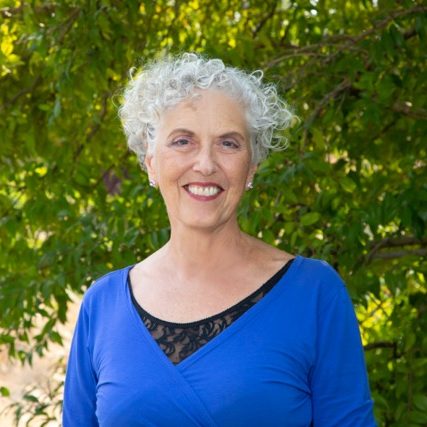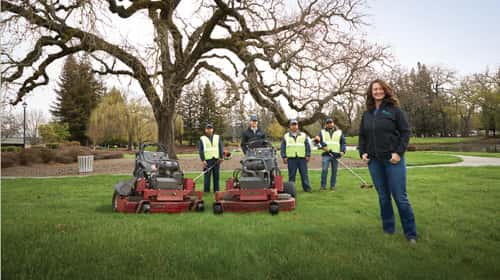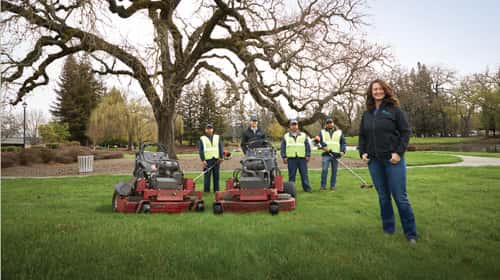
While more and more women at the executive level are cracking—and shattering—the glass ceiling, there’s still room for improvement. Witness the Fortune 500 list. In 2018, only 24 women chief executive officers led these major companies. That number was down from 2017’s record-breaking 32 female CEOs in the Fortune 500—a drop from 6.4 percent to 4.8 percent. The list has been published every year since 1955, but only noted top executives’ gender for the past decade. It’s anyone’s guess what the female chief executive percentage was previously. However, the trend for women in top leadership locally is moving steadily upward, according to some North Bay staffing and executive recruiting firms.
Chuck McPherson, a partner at Santa Rosa’s Leap Solutions, a group of organizational development, management and human resources professionals, says that in the past two years, Leap has placed nine women in top positions, and four others in second-in-command jobs. He defines “top” as chief executive officer, executive director, and a vice president or chief financial officer who has an “absolute strategic relationship with the CEO.” The description also includes a large organization’s higher management positions such as director of marketing.
“Just look at our own company as an example,” McPherson says. “There’s me and my business partner, Scott Ormerod, and all the rest are women. I always say it’s because women are smarter!” According to McPherson, they get teased a lot. “People ask, ‘When are you going to hire a guy?’ and I say, ‘When we find the perfect guy, we’ll hire him.’”
“We are always looking for the right candidate regardless of gender, and we present to our clients those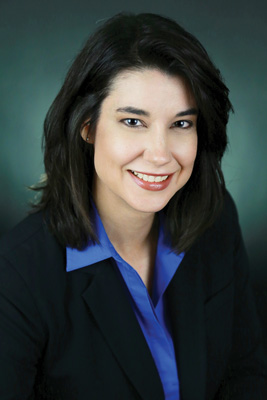 who most closely match what they are seeking in terms of skills and fit with the company culture,” adds Mary Henderson, Leap Solutions executive recruiter. “We have noticed lately that many women have emerged as the strongest candidates.”
who most closely match what they are seeking in terms of skills and fit with the company culture,” adds Mary Henderson, Leap Solutions executive recruiter. “We have noticed lately that many women have emerged as the strongest candidates.”
Henderson observes that women who have worked in male-dominated or diverse environments and know how to operate there have been mentored by both males and females, and know how to deliver on expectations. “These women are not afraid to talk to either men or women. They take advantage of receiving help and feedback from both.”
McPherson adds, “I don’t want to generalize, but there might be ego involved for a man to seek mentorship from a woman to get that kind of balance. And again, not to generalize, but the male leaders I’ve seen who have a greater depth of experience, often were mentored by women along the way. Maybe they had women bosses. You can see their softer side come out in how they lead.”
A great moment for women
Artizen Staffing hires at the business professional level, primarily in banking, finance and information technology. Among the agency’s clients are Graton Resort and Casino, eBay, Amy’s, and Burr Pilger Mayer. Chief Executive Officer, Rosanna Hayden, asserts all that is required to succeed is to “believe in yourself.” Yet, she concedes that two recent pieces of legislation will aid women in getting to into higher positions.
A new law requires that companies headquartered in California can no longer have all male boards. Publically traded firms are required to have at least one woman on their board of directors by the end of 2019, or face a penalty. Companies with five directors will be required to include two women by the end of 2021, and companies with six or more directors must add at least three more women by that same deadline. This, according to CNN Business, is the first such law in the United States, though similar measures are common in European countries.
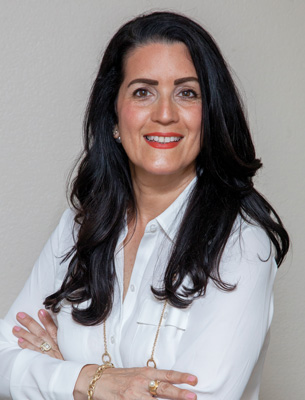 “This is a fantastic time for women, because of the Gender Representation on Boards of Directors law (SB-826) that went into effect on January 1,” says Hayden. “And also because of recent changes to the California Equal Pay Act and the Fair Pay Act, which require equal compensation for employees who perform ‘substantially similar work.’ It doesn’t even have to be the same job title.” Additionally, it now explicitly prohibits an employer from justifying an otherwise unlawful difference in pay on an employee’s or applicant’s prior salary alone, according to Hayden. “Employers may no longer ask a candidate about how much they were paid in a previous job.” Still, she adds, “Men are often paid more because they ask. Women need to ask, even demand, because there are laws that back them up.”
“This is a fantastic time for women, because of the Gender Representation on Boards of Directors law (SB-826) that went into effect on January 1,” says Hayden. “And also because of recent changes to the California Equal Pay Act and the Fair Pay Act, which require equal compensation for employees who perform ‘substantially similar work.’ It doesn’t even have to be the same job title.” Additionally, it now explicitly prohibits an employer from justifying an otherwise unlawful difference in pay on an employee’s or applicant’s prior salary alone, according to Hayden. “Employers may no longer ask a candidate about how much they were paid in a previous job.” Still, she adds, “Men are often paid more because they ask. Women need to ask, even demand, because there are laws that back them up.”
Many of the executives Hayden has placed are in fields that contain a high percentage of women who study and graduate in those fields—for example, accounting and finance. She says degreed positions are increasing in demand, and educators need to get girls interested in STEM (Science Technology, Engineering and Mathematics) programs that frequently pay more. Employers must start considering the overall economy and prepare to hire young professional women and train them—to bring them through the minor leagues so to speak— to take advanced positions from within the organization. “Last year, I placed an environment and development engineer. After one year on the job, she became the vice president and director of IT and operations.”
Paige Mazzoni
Chief Executive Officer
Canine Companions for Independence
When Paige Mazzoni submitted her résumé to Leap Solutions in 2018, she was applying for a marketing position grounded in her extensive experience in management roles at Oracle, Sybase, Fair Isaac and the Nelson Family of Companies. Most recently, she had spent three years at VIP Petcare handling all aspects of branding, corporate communications and nationwide marketing. Mazzoni didn’t expect that she was about to land her dream job.
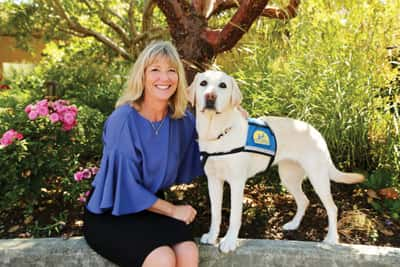 Canine Companions for Independence, with assets of more than $40 million and an operating budget of $29 million, has its national headquarters in Santa Rosa, with a training center for service dogs there and in five other locations throughout the country. Mazzoni is now the organization’s chief executive officer. Why did this Stanford graduate, who has been working steadily in Silicon Valley and environs since two weeks after finishing college, decide to enter the nonprofit sector?
Canine Companions for Independence, with assets of more than $40 million and an operating budget of $29 million, has its national headquarters in Santa Rosa, with a training center for service dogs there and in five other locations throughout the country. Mazzoni is now the organization’s chief executive officer. Why did this Stanford graduate, who has been working steadily in Silicon Valley and environs since two weeks after finishing college, decide to enter the nonprofit sector?
“I’ve always been a member of nonprofit boards,” Mazzoni says. “I was happy in high tech. I loved the pace, how fast it moved. I loved the challenge. My parents were supportive of education and encouraged me to chase all opportunities that were presented. I had a lot of financial and emotional support growing up, so I always felt it was my duty to contribute.”
Mazzoni continues, “It’s hard because when you have a long career in the for-profit sector, nobody believes that you really want to go to a nonprofit.”
Canine Companions had grown to a point where it needed the professional experience in process and infrastructure that Mazzoni possessed. The job was helping people with disabilities, and she had been on boards of agencies helping kids with disabilities. Her most recent position was chief marketing officer for a nationwide pet wellness and preventative veterinary care company.
“It was the perfect match,” Mazzoni says. “I was also impressed by how much the Canine Companions board cared about who they wanted in this role—not only for the skills, but for the ethics of the person. They wanted a CEO who would have compassion for the people who were served, and the ability to grow the people who served. That was important to me.”
Mazzoni believes the North Bay is ahead of many areas, regarding female leadership with so many women as executive directors of nonprofits and as leaders in the wine industry. And with every generation, the assumptions change of what women can and can’t do evolves. Mazzoni never assumed she couldn’t have a career and be a mother, too. “I had to make accommodations when the kids were little, but I was still able to keep a career.” She has four children, three are now in their twenties and her youngest daughter is 16. The children and their peers are more gender blind than older folks, she adds. The laws that mandate equal pay, harassment training and a higher awareness of appropriate workplace speech and behavior have helped this evolution.
“Discrimination, however, is a lot more subtle than sexist language, Mazzoni says. “You may see women getting passed over and passed over. Or, a woman says something at a table during a meeting and nobody hears it, then a man says the same thing and is praised.” Her mentors taught her to speak up in the moment, to control emotionality, and to find places where her contributions were appreciated. “Don’t let those who throw roadblocks in your path tear down your self worth.”
At one of Mazzoni’s first company meetings at Canine Companions, someone asked about her core values, and courage is at the top of the list. “First is personal courage. Learning how to ‘still yourself and find your steel’ is an important skill.” And then she recounted this incident: “I once had a female boss who summoned me to her office after a meeting in which I had been presenting and was shouted down by a louder male voice. She asked if I’d done my homework, if I knew I was right, and I answered, ‘Yes.’ Slowly and firmly she admonished, ‘Don’t you ever back down again in that situation!’ That was a huge, hard lesson for me. Not only was I not doing right by myself, but I wasn’t doing right by the organization either.”
Kelly Solomon
CEO-President
Signature Coast Holdings, LLC
The denim baseball cap gifted to Kelly Solomon by one of her team members is embellished with glitz and rhinestones that spell out the word “BOSS.” That is an understatement. According to Brian Horn, editor of Lawn and Landscape magazine, she is one of only three female CEO-presidents in the top echelon of landscape contractors in the nation. Solomon’s Signature Coast Holdings was No. 67 in the LM150: 2018 Rankings (Landscape Management’s listing of the industry’s top 150 revenue-generating firms.) The commercial landscape contractor, headquartered in Napa, serves 11 counties in California and four counties in northern Nevada, offering maintenance, enhancements, tree work, bare dirt installation, design, masonry and hardscape.
“My husband jokes that I will never rust, because I never stop moving,” Solomon says. “When I was 18 and wandered through a career fair, I kept thinking that this wasn’t what I wanted. Though I valued collaboration and wanted to learn, my biggest desire was to work for myself, to have the freedom of being my own boss, to have the flexibility to leave before 5 p.m. to make it my child’s game.”
Solomon started UpValley Landscape in 2000. Through all the growth and acquisitions made by her company— a registered woman-majority-owned business in 2005 and on pace to hit $45 million this year—Solomon has maintained a family atmosphere. Coast was named a “Best Place to Work” in the North Bay for nine consecutive years.
“The company matches funds that employees collect when there is a death in a family. Our dogs come to work,” Solomon says. “I also strongly believe in training and continuing education. If you grow as a human being and feed your passion for learning, it makes you a better mother or father at home, a better worker at work.”
Solomon herself never completed her college degree. “I don’t want my people to give up hope in their own education,” she continues. “If an employee wants to learn English, our company will pay for the class. We have an in-house training program for landscaping skills; we take time out of the workdays to learn to name and identify plants; and we have company trainers who travel company-wide to our teams to teach horticulture in a formal manner. It’s rare for a landscaper to do this.”
As an active member of Vistage, an international CEO and senior management peer group, Solomon is a strong believer in mentor advisory and executive coaching. “How this translates for me is that we have nearly 600 employees, and I have a lot to tackle to make the company consistent. That organization has helped me put a structure around learning, so I can teach my senior leaders and they, in turn, can teach their people.”
Solomon has her tales to tell. There was the irate commercial client who called her out to a site with an irrigation installation complaint, and berated her with, “I don’t know why you’re in this business. You should be in the kitchen making pies.” After Solomon addressed the problem satisfactorily, she and the client parted ways, but upon severing the relationship, she had an apple pie delivered to him.
Leslie Ruhland
Co-founder/EVP
Accuchex
In tracing the path of Leslie Ruhland, a pattern emerges similar to that of other founders of long-lived businesses. “You start a company with the desire to fulfill a dream or secure a livelihood,” says Ruhland of her experience. “Then, you work primarily for the maintenance and well-being of your family and then, you work for the sake of the people you employ and the security of their families. Ultimately, you expand your commitment to your community as a whole by volunteering, by serving on boards of directors, by being a good citizen.”
A Marin County native, Ruhland has traveled extensively, including several years living in South Africa when she was a teenager. An early business venture was energized by the outdoor life in Aspen, Colo., where she co-founded and operated High Altitude Cuisine, a well-regarded restaurant and catering business. Upon returning to the San Francisco Bay Area, she managed new restaurant openings for a restaurant hospitality chain.
“My father was my mentor,” Ruhland says. “His attitude was always ‘can do.’ He allowed me an 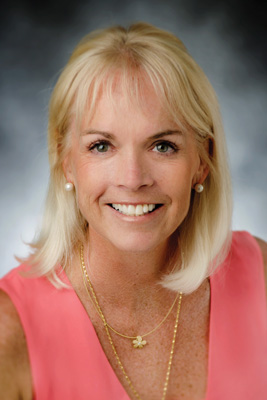 opportunity to take risks, back in the late ’80s when I owned the restaurant in Aspen. He inspired me to find a career that supported my personality and my skills. It turned out that payroll was close to the hospitality business; I spoke that language. It was Dad who introduced me, and my then-husband Jim, to the idea of outsourcing business services. Now here I am, executive vice president of Accuchex Corporation which will celebrate its 30th anniversary in 2020.”
opportunity to take risks, back in the late ’80s when I owned the restaurant in Aspen. He inspired me to find a career that supported my personality and my skills. It turned out that payroll was close to the hospitality business; I spoke that language. It was Dad who introduced me, and my then-husband Jim, to the idea of outsourcing business services. Now here I am, executive vice president of Accuchex Corporation which will celebrate its 30th anniversary in 2020.”
Located in Novato, Accuchex is a premier provider of comprehensive workforce management, including payroll processing, payroll tax services, time and attendance management, insurance and employee benefits and human resource outsourcing. “We’re in the business of compliance, making sure our clients are satisfying their legal obligations,” Ruhland says. “We serve employers by providing the tools they need to protect employees and to pay them correctly and on time.”
Ruhland’s responsibility is to lead the company’s business development efforts, expand the sales team and forge strategic alliances. She also manages the internal accounting and the internal staff of 20, and represents Accuchex in the community. She’s on the board of the San Rafael Chamber of Commerce and has served on key committees including Governmental Affairs and Workforce Housing and Leadership Institute. She chairs the Chamber’s annual event for the Women of Industry Award—an honor accorded to an exemplary San Rafael businesswoman who has made significant contributions to the citizens and businesses of Marin County.
Asked if she ever experienced discrimination in her career, Ruhland responds with a hearty laugh. “Oh my goodness, yes!” She recalls being literally chased around the desk when working for the hospitality corporation. “In restaurants, the management area is usually small. You share a desk and people are literally ‘on your back.’ It was extremely easy to be rubbed against.” At one point she declined a manager’s invitation to come to his hotel room to discuss work issues over a bottle of wine. She resigned shortly thereafter with a letter to the chairman of the board explaining why. “The chair asked me to stay on for a month to hire my own replacement, but I never received an apology.”
Some years later, when she first started Accuchex, Ruhland wanted to help build the company’s reputation by joining Rotary. “That may have been in the early 1990s and all chapters had not yet become inclusive,” she says. “The Rotarian who answered the phone said, ‘No sweetie, this is not the place for you.’” Ironically, it is now part of Ruhland’s business portfolio to help organizations be proactive in putting sexual harassment policies in place, and to help with mandatory harassment training to avoid lawsuits and assist employees to learn what is, and is not, appropriate workplace behavior.
“Sometimes I feel like a 16-year-old girl in a grown-up body. I’m having so much fun,” Ruhland says. “I love what I do, and I love the families who depend on us. The average stay for our employees is 15 years, and I think it’s because we take great care with our culture of diversity and family-friendly policies.”
Ruhland’s advice for young women who want to get to the top? “Go for it! Listen to the people around you who have found success. Always give thanks and praise to those who helped you.” And, apropos of her financial expertise, “Pay yourself first.”
Are You Ready to Leap?
As executive coaches and recruiters, Mary Henderson and Chuck McPherson of Leap Solutions offer these tips for women who want to prepare for top positions.
• Understand your gaps in skill sets, and then bump them up.
• Seek mentors of both sexes.
• Get professional coaching.
• Find and use external resources for support such as spouse, family and friends.
• Take time for self care.
Women at the Helm
Tips for Success
Here are some of the takeaways that Rosanna Hayden of Artizen Staffing offers to aspiring women based on 30 years of experience in corporate management as a successful business woman and hiring manager.
Take advantage of your strengths. Women are more empathetic, we listen, we can see things from another perspective, we (on the whole) have less ego. We are more detail-oriented, more verbal; we can take directions and run with them. All these add value to a team. There are ways to use emotional intelligence positively, instead of, for example, “taking things personally” or “assuming things are our fault” if a boss or a colleague seems stressed.
Use mentors and study your predecessors. Ask superiors “What are the things you really liked about the person who did the job before me? Whatwere areas that needed improvement?” Right there is your roadmap for success.
Be committed to continuing education and join professional associations. Go back to college or take courses to stay current in your field. Learn from your peers. The more connections you make, the more you develop necessary management skills.
Try to overcome cultural prohibitions on succeeding. Perhaps you are the only one in your family who has a college degree, or listing your accomplishments feels like “showing off.” There is a difference between being aggressive and being assertive. Let your light shine!
Have patience. You are not going from receptionist to CEO in a year.
As a woman executive, be supportive of other women executives. Understand that women in high positions need a unified front, with no place for professional jealousy or cruelty. A friend of mine spoke at an industry event where only 10 percent were women; she was booed as she stepped onstage before she said a single word. When she challenged those who booed to engage in dialogue about it, they were mostly all women. She answered their objections, but it was still disconcerting.
Set goals and never stop challenging yourself. At the same time, follow your bliss and go to the place where you believe you will be successful because your heart is there.
Drawn from Rosanna Hayden’s chapter “Women at the Helm” in a forthcoming book, The Year of the Woman is Now edited by Patricia Drain, Gilbert Thomas Press.


